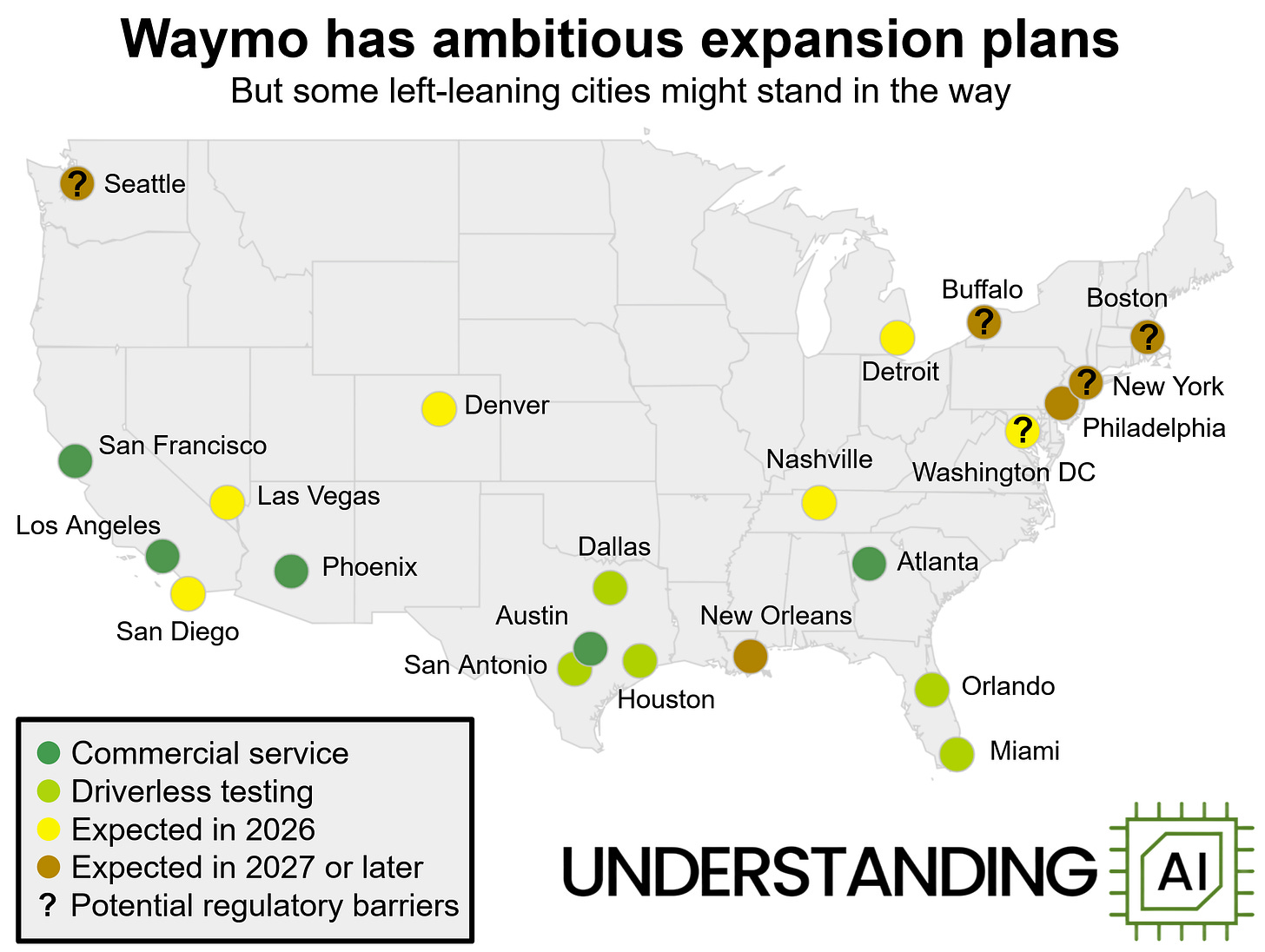Waymo’s next five cities are all in red states
Liberal cities risk falling behind on driverless technology.
Understanding AI will once again participate in the Tarbell Fellowship program in 2026. Fellows receive three months of journalism training (starting in June 2026) and then get placed with a news organization like Understanding AI. This year’s Tarbell fellow, Kai Williams, has done some amazing work already. The fellowship pays $60,000 to $80,000—or more for experienced journalists. The deadline to apply is January 7. Apply here!
On Tuesday, Waymo announced driverless testing in five cities: Dallas, Houston, San Antonio, Miami, and Orlando. Driverless testing begins immediately in Miami, while the other four cities will begin “over the coming weeks.” Waymo says commercial service will launch in all five cities in 2026.
It’s a palpable acceleration of Waymo’s commercialization efforts.
Waymo launched its first fully driverless service in Phoenix in 2020. Commercial service began in San Francisco and Los Angeles in 2024, with Austin and Atlanta arriving in 2025. Now Waymo is signaling that it will add at least five more cities to its lineup in 2026.
And probably several other cities as well. Waymo has previously announced 2026 launch plans in six other US cities — Denver, Detroit, Las Vegas, Nashville, San Diego, and Washington DC — plus London. None of these cities has begun driverless testing yet. But if all goes according to plan, Waymo will be offering service in at least 17 cities by the end of next year — more than triple the number Waymo serves today.
I don’t think it’s a coincidence that today’s announcement comes on the heels of last week’s news that Waymo will begin commercial service on freeways. A taxi service that didn’t operate on freeways would have been a non-starter in famously sprawling cities like Dallas or Houston.
It’s also not a coincidence that all of the new driverless cities are in Texas or Florida, Republican-dominated states with favorable regulatory climates.
Waymo announced plans to expand to Washington DC way back in March. As a DC resident, I can confirm that the company has been testing in the city for months. But so far, all of that testing has been conducted with safety drivers. DC law doesn’t provide Waymo with a clear path to launch a driverless commercial service in the city. And the city council has been dragging its feet on legislation to change that.
The story is similar in a few other blue states:
Massachusetts law doesn’t provide a clear path to deploy robotaxis in Boston. Instead of trying to fix that, Boston officials have been considering legislation to explicitly ban driverless vehicles.
In Washington state, the law allows testing of autonomous vehicles but doesn’t offer a clear path toward commercialization. Legislation to authorize robotaxis in the state hasn’t gotten traction, and other legislators have proposed a bill that would ban the technology.
New York law requires a person to have “at least one hand on the wheel.” Legislation to change that hasn’t made much progress through the state legislature.
So although Waymo has done some preliminary testing in Seattle, Boston, Buffalo, and New York City, the company hasn’t been able to begin driverless testing — the last major step before commercialization. This has prompted Waymo to focus its testing efforts on red states with more favorable laws.
I hope Democratic lawmakers think carefully about the pattern that is emerging here.
In a couple of years, driverless taxis are going to be ubiquitous across the Republican-dominated Sun Belt. Left-leaning cities like Boston and New York like to think of themselves as progressive, cutting-edge jurisdictions. So it would be awkward if they blocked the introduction of a technology that has the potential to reduce crashes while saving passengers money.
It doesn’t have to be this way. Indeed, not all blue states have been hostile to autonomous vehicles. Under the leadership of Governor Gavin Newsom, California has allowed Waymo to deploy its technology in San Francisco and Los Angeles. Last week, Waymo announced it would extend its robotaxi service from San Francisco all the way down the peninsula to San Jose. Waymo plans to launch in San Diego next year.
The situation is similar in Colorado, where Governor Jared Polis has supported autonomous vehicles. Earlier this year, Polis vetoed Teamster-backed legislation that would have banned large driverless trucks in Colorado. Waymo is planning to launch in Denver in 2026.
Three purple states — Michigan, Nevada, and Pennsylvania — also have favorable laws. This may allow Waymo to expand to Las Vegas and Detroit in 2026 and Philadelphia soon after that.
But policymakers in some blue states — as well the District of Columbia, where I live — seem happy to let Republican-dominated states adopt the technology first.




For starters
1. > 80% reduction in accidents
2. Far fewer fatalities
3. Quiet CLEAN AVs
4. Waymo's don't assault children or women
5. Big reduction in jammed parking and traffic coming
Let the Blue States arrogantly continue their unscientific, uninformed slide
into the abyss.
In Boston, the unions are protesting and fighting back against Waymo. We heard 2nd hand that the Mayor may be supporting this. A bunch of us in AI believe this is a wrong for safety and reputation reasons. We started a petition for "Bostonians Supporting Waymo"
https://www.change.org/p/approve-the-use-of-waymo-taxis-in-boston?recruiter=1395561614&recruited_by_id=b5e0f2d0-c23c-11f0-aa5d-25741a1cfc5c&utm_source=share_petition&utm_campaign=share_petition&utm_term=starter_onboarding_share_personal&utm_medium=copylink&utm_content=cl_sharecopy_490886668_en-US%3A9